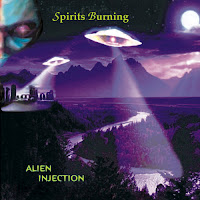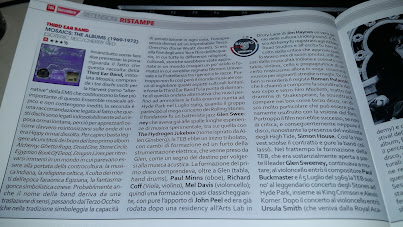"Third Ear Band fits in a category of music output that I describe as being timeless. Usually, I use that category to describe electric-based artists: Jimi Hendrix and Electric Ladyland, Can’s Landed in terms of its synth sounds, maybe something like Vangelis’ Blade Runner. While TEB used a VCS on occasion, they were essentially an acoustic-based band, and yes they were rich in a coat of folk, and medieval sounds. However, like those other artists and bands, they also sounded ahead of their time, putting out music that was very different than their contemporaries. And most importantly, the music has aged well. That’s what being timeless is to me.
Has this inspired my musical voices? Of course. That’s why I would mention them to invites during the early days of “Evolution Ritual.”
11. If it's so, have you taken something from their experiences? What?
"I would be remiss to not mention TEB and their improvisational approach to music. There is a continuous winding, uncharted path in many TEB songs, and that can be exciting for the musician, and for the listener. All the while, the entire band, seems like they are simultaneously heading in the same, and different direction. It’s quite exciting. It is this sense of acoustic arpeggios, movement, mystery, and otherworldliness that feeds into the possibility of a Spirits Burning album being an acoustic space rock album.
While "Evolution Ritual" took other turns, and Spirits Burning more often is not as complicated as some TEB songs, I’m always looking for the mystery in a song, and in its sounds. Plus, there is a hidden improv approach that has been there from the first album to the most current one. For example, when musicians like Daevid Allen or Nik Turner recorded at my home studio over the years, I would present the song, press record, and they would improv on the spot. It was rare that they would work out their musical performance ahead of time. In fact, one of the most interesting recordings was Daevid eyeing my music room bookcase, picking up my college thesis (a book of poems), and then randomly choosing lines to read and emote against the musical landscape. That sense of improv is even there when I do keyboard solos. Or, some of my piano-based ideas. For those ideas, I tend to not overthink things, and just dive in, to see where it leads me.
It prepared me mentally to try to apply the same energy and interaction to local or remote recording sessions in the here and now, and even to how I choose to play my own parts, or how I choose to mix. It’s always with the sense that we are in the same room, interacting, even if we are not. My hope is that many of the contributing musicians are doing the same thing on a certain level. If they ask for guidance, I try to keep that approach in mind as I provide what I would provide verbally if we were in the same room. At the end of the day, I want Spirits Burning to sound like a band, and not a solo album with guests; to sound like a band of equally contributing members.
I have to admit that I clearly miss playing with musicians in the same room. Especially a live drummer, as it can totally shape and reshape how you play a song, or even how you write a song. That said, I do not miss the actual rooms we used to rehearse in, or the cost of the room, or parking in sketchy parts of town, or lugging equipment around, or getting home late when you have to work the next day. Those factors cover some of the reasons why that part of my life closed long ago. Before the pandemic happened, I did have a few occasions to use the music room at Dolby to jam with a few co-workers, and it brought back some good memories. Especially when I played bass guitar, and visually and sonically played off of the drummer."
My keyboard options include a mix of virtual instruments (plug-ins that you trigger via a MIDI controller) and physical keyboards. I use a Kurzweil K2000 as my controller, as it is a larger keyboard, and I like the feel of the keys.
I record and mix on a Pro Tools system, and use Avid and AIR plug-ins that run on that system. There is a great Hammond organ, acoustic and electric pianos, and a number of synths, including Virus Indigo. I also have the Structure sampler plug-in, which lets me trigger acoustic sounds, from orchestral to ethnic to pianos (like a Bösendorfer). I used Structure for some of the pitched and unpitched percussives that you hear on “Evolution Ritual.”
 I’m also fond of capturing found sounds for use in songs. For “Evolution Ritual,” these were unaffected, to stay true to the acoustic premise of the album. For example, there were DaVinci devices that I recorded at a museum in Albuquerque. In San Francisco’s Golden Gate Park, there was a giant box that had giant strings in it, like being inside of a piano, and I recorded plucks and strums within it. For other albums, I’m more likely to process or affect a found sound. For instance, on the Grindlestone “Tone” album there is sample from one of my MRIs that is heavily effected.
I’m also fond of capturing found sounds for use in songs. For “Evolution Ritual,” these were unaffected, to stay true to the acoustic premise of the album. For example, there were DaVinci devices that I recorded at a museum in Albuquerque. In San Francisco’s Golden Gate Park, there was a giant box that had giant strings in it, like being inside of a piano, and I recorded plucks and strums within it. For other albums, I’m more likely to process or affect a found sound. For instance, on the Grindlestone “Tone” album there is sample from one of my MRIs that is heavily effected.  I guess I consider all the effects in Pro Tools to be instruments, as least from a production standpoint, or when doing something more experimental. Of those tools, I’m quite fond of the ReVibe reverbs and TL Space’s convolution reverbs, and I’ve been playing with distortion a lot lately. Plus, I have a wonderful Eventide Harmonizer rackmount that I typically use for vocals. However, with the instrumental “Evolution Ritual,” I didn’t use the Eventide at all, or any distortion. I only used the plug-in reverbs that sounded natural. It’s probably the one Spirits Burning album that had touches of natural reverb added during mastering."
I guess I consider all the effects in Pro Tools to be instruments, as least from a production standpoint, or when doing something more experimental. Of those tools, I’m quite fond of the ReVibe reverbs and TL Space’s convolution reverbs, and I’ve been playing with distortion a lot lately. Plus, I have a wonderful Eventide Harmonizer rackmount that I typically use for vocals. However, with the instrumental “Evolution Ritual,” I didn’t use the Eventide at all, or any distortion. I only used the plug-in reverbs that sounded natural. It’s probably the one Spirits Burning album that had touches of natural reverb added during mastering."15. You think it's a false issue...
"There is always room. What isn’t as assured is the size of the room, or the number of people in that room.
 |
| Don singing on stage at Kozfest in 2017 (photo by Michal Skwarek) |
Ongoing, on the music side… Most of the sessions and mixing for “Evolution Ritual” overlapped with two Spirits Burning & Michael Moorcock albums. There was the completion of “The Hollow Lands,” and the development of “The End Of All Songs,” which I hope to complete in mid-2022. Over the last year, most of the songs for “The End” were written and initial parts recorded, and then I began inviting musicians. Some of the returning crew include Al Bouchard and Donald Roeser from Blue Öyster Cult, and Hoshiko from Tangerine Dream. In the queue, and with fingers crossed are some first-time Spirits Burning contributors: David Cousins of The Strawbs and Paul Rudolph of the Pink Fairies.
Most of the songs still need lyrics and vocals. Al (Bouchard) is transcribing Mike’s text to create lyrics and vocal lines like he did for the previous SB & MM albums, when he isn’t working on his own music projects. At some point during the pandemic, I was honored to play keys on a track for his next solo album — Imaginos II, Bombs Over Germany (Minus Zero and Counting). This one has an October, 2021 release date, and is now shipping".
I also just finished an uptempo Spirits Burning song for a future Flicknife Records compilation. The song is titled “Purse (You For A Day).” It’s a fun punky, new wave song that might surprise some people. I wrote it back in the 80s, and started to resurrect it a few years ago. Nik Turner plays sax on it, and my wife did the lead vocals. To compete the song, I set up a long-distance guitar session by Joe Diehl, who was one of the guitarists who played the song back in the day. He did multiple parts this time, and it’s actually quite intricate. I’m definitely excited about it."
 | |
| Spirits Burning at Kozfest in 2017 (photo by Michal Skwarek) |
"It’s hard to have regrets when you’ve done more than you could have imagined when the journey started. When I was listening to music in the 70s, or when I first picked up a bass guitar, or when I joined my first band, there was no way I could have imagined that I would someday be collaborating with some of the musicians I was listening to.
I’m really proud of most of what I’ve been involved with over the years. Yes, there is a small handful of songs that I wish I would have mixed differently, or approached slightly differently. But those are few and far between. Recently, I was listening to songs on shuffle mode, and I was amazed at how well some Spirits Burning songs sounded next to songs by other established artists (like Godspeed You! Black Emperor, Hawkwind, and even Kate Bush). As I continued to listen, Spirits Burning, as well as my work with Michael Moorcock & The Deep Fix and the Daevid Allen Weird Quartet sounded so fresh. In fact, I had forgotten some of the wonderful things the line-ups for a given piece had done.
I can see where I might wish one band or another had survived longer. I was in an incredible ambient-ethno experimental band called Thessalonians. They kind of had more in common with TEB than any band I’ve ever been in, given that they were tabla-based rhythmically, as opposed to rock drums. The line-up for our “Soulcraft” album did one album and gig. I would have loved to have done more gigs and albums with that line-up.
Overall, though, it’s never about regrets. It’s more about wishes, and what you did, or decide to do with those wishes. That can mean keeping a wish in place, and being patient until the time is right. “Evolution Ritual” is a great example of this, as it took me a few years to get to my dream of doing an acoustic Spirits Burning album."



















































































